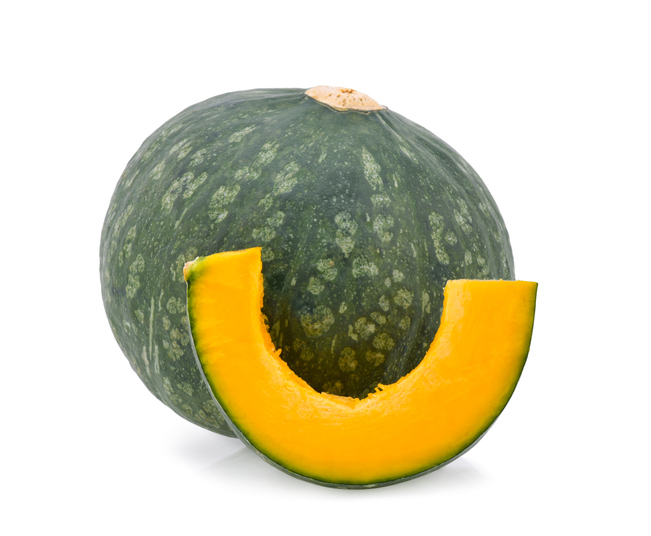5 Reasons To Give Kabocha Squash A Go!

There are more than 100 types of squash! Just to name a few, there’s zucchini squash, butternut squash, yellow squash and acorn squash. My personal favorite is the Kabocha squash, also known as Japanese pumpkin. You have likely seen Kabocha squash at your favorite Japanese restaurant, sliced, battered and fried as part of a tempura dish.
In my opinion, it is one of the sweetest squashes out there. The best way I can describe the taste and texture of Kabocha squash is that it’s as if a sweet potato and pumpkin had a baby! It’s delicious, comforting, healthy (if prepared the right way) and a great squash to include in your cookiing routine as you shelter in place
.

Vitamin A is a nutrient that we all need. It’s great for bone health and just as important as other nutrients like vitamin C, vitamin D, calcium, iron, magnesium and others. Along with bone growth, vitamin A plays a role in vision, immune system health, reproduction, cell division and cell differentiation. Vitamin A is also a powerful antioxidant that helps fight inflammation by reducing free radical damage. This vitamin may even reduce the risk of heart disease.
Just one cup of Kabocha squash has more than 90 percent of your daily recommended amount of vitamin A.
I used to associate vitamin C with only citrus fruits such as oranges, grapefruits and lemons. But Kabocha squash is also a great source of vitamin C, which is important to me because I have a genetic predisposition to be low in this essential nutrient.
Vitamin C protects the immune system from deficiencies that may lead to cardiovascular illnesses and other diseases. It is one of the most important nutrients needed for our survival. It is also an antioxidant, which means it protects our bodies from free radicals and other harmful molecules. It is a major producer of collagen, which is the main ingredient behind the repair of bone and skin tissue, cartilage, ligaments, tendons and teeth. Vitamin C also helps moisturize and nourish the skin, which may increase skin elasticity and may even restore a youthful appearance.
This vitamin may even help with complications from diabetes.
Kabocha squash is a low glycemic food.
Eating low glycemic foods can be very beneficial to your health.
“A low-glycemic diet can help you control your weight by minimizing spikes in your blood sugar and insulin levels. This is particularly important if you have type 2 diabetes or at risk of developing it. Low-glycemic diets have also been linked to reduced risks for cancer, heart disease, and other conditions,” reports Harvard Health.
(Apples, oranges, sweet potato, kidney beans and lentils are examples of other low glycemic foods).
Kabocha squash is a good source of fiber.
Fiber may help relieve constipation, soothe irritable bowel syndrome (IBS) and may even help prevent colon cancer. Fiber can also make you feel more full for a sustained period of time (which could prevent overeating later). In addition to this, fiber can help lower bad cholesterol levels and help manage your sugar levels.
Kabocha squash contains iron.
Iron is a very important mineral that we all need to survive. Every single cell in our body needs it to function optimally. Specifically, we need iron to make hemoglobin (a component of our red blood cells) which delivers oxygen to all the cells in our bodies. To put our need for oxygen in perspective, we can live for weeks without food, days without water but only a few minutes without oxygen. Without enough iron, our bodies will not be able to carry sufficient oxygen to our vital organs and this may cause us to feel tired.
Kabocha squash is very versatile and there are so many ways to prepare it. I know battered and fried as tempura may sound good, but trust me when I say there are healthier ways that are even more delicious.
You can roast kabocha squash in the oven and sprinkle with a bit of cinnamon. You can also do a curried Kabocha squash soup or a Kabocha squash salad.
One of the great things about this squash is that reports of allergies or interactions with this food are rare, however, if you are taking any medications or have any existing health issues, it is always advised that you speak with a competent healthcare professional regarding what foods you are including in your diet.
Enjoy your healthy life!
The pH professional health care team includes recognized experts from a variety of health care and related disciplines, including physicians, attorneys, nutritionists, nurses and certified fitness instructors. This team also includes the members of the pH Medical Advisory Board, which constantly monitors all pH programs, products and services. To learn more about the pH Medical Advisory Board, click here.







